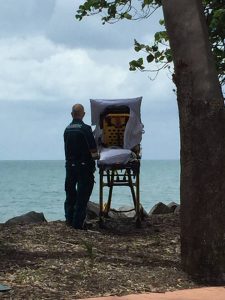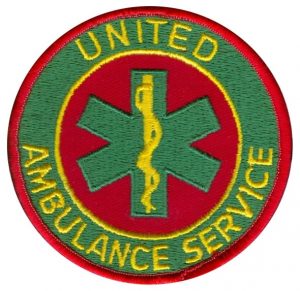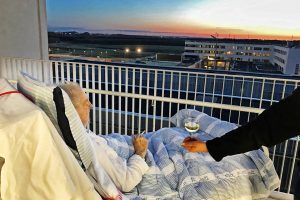In This Episode: Three amazing stories of medical professionals going outside protocol to do the right thing: to be fully human in the face of death — all in just 9 minutes.
002: Reverberating for Decades
Tweet
How to Subscribe and List of All Episodes
Show Notes
- To help support Uncommon Sense, see the Patron’s Page, or the form in the sidebar.
- Since this is mostly photos (which you can click to see larger), I’ll do the rest with paragraphs rather than bullet points. First up is the paramedic letting his dying patient have one last look at the beach:

United is long gone (and they switched to a new patch during my tenure; this is my old one):

Last is Carsten Flemming Hansen looking at his last sunset:

Transcript
If there’s any profession the public deals with on a regular basis that’s bound by rules and protocols it’s medicine. In life or death situations, scrutiny is high, and professionals — particularly in the United States — know that everything they do might be reviewed by lawyers looking to justify a lawsuit. But some do the human thing anyway, guided by their Uncommon Sense. This episode has several inspiring examples.
I’m Randy Cassingham, welcome to Uncommon Sense.
There was a story in issue 1226 of the newsletter about something rather unusual that paramedics in Australia did that wasn’t about dumb people doing stupid things. I’m going to read the story verbatim. It’s called Final Wish:
Paramedics in Hervey Bay, Qld., Australia were taking a terminally ill woman to a hospital when she sighed, she wished she could “just be at the beach,” rather than go to the palliative care unit. “Above and beyond, the crew took a small diversion to the awesome beach at Hervey Bay to give the patient this opportunity,” says ambulance officer-in-charge Helen Donaldson. “Tears were shed and the patient felt very happy.”
My tagline on the story is: “Life’s a beach, then you die.”
Sadly, the story made it into a “weird news” newsletter because it’s so unusual. I think it’s a wonderful story and readers loved it, and the tagline. The reason we know about this event is Queensland’s Ambulance Service posted about it on Facebook, with a picture that is on the Show Page. I’m afraid that in the U.S., medics could be disciplined for doing something like this. But Down Under, the crew was praised. The service concluded their online post, “Great work Hervey Bay team Danielle & Graeme. The Service is very proud of you.” And as a volunteer medic in a rural area in the U.S., I’m proud of them too. In the photo, we can see they took the gurney out of the ambulance and rolled the patient out on a bluff overlooking the ocean so she could not only see the water one last time, but feel the breeze and taste the salt air.
Graeme is standing there, back a little bit, waiting with her, watching over her to make sure she’s OK, but just giving his patient that last moment. This isn’t a drive-by “hey look out the window when we go by here and look at the beach.” No. They stopped, they took her out, and rolled her off the pavement so she could really experience the ocean one last time.
In a field bound by protocol, medics do learn to think outside the box. Still, it’s unusual. Medics are usually in hurry-up mode, get things going and get back in service so they can take the next call. But instead these medics took a few minutes out to give their patient what she really needed. They exhibited Uncommon Sense.
It reminds me of when I was a full-time medic in California. We were called by a doctor to go to one of his patient’s house and bring him directly to Intensive Care. It was a sobering scene for me as a young medic: the patient, in his 30s, was on a hospital bed in the living room — a common thing to see with terminal patients. This man’s young children were there, as well as his wife, and his problem was that he was having muscle spasms in his back, which pulled on his spine, which was riddled with cancer. That caused waves of pain, which caused him to flinch, which triggered muscle spasms — in a nasty feedback loop.
My partner and I carefully moved him to our gurney, and gingerly took him out and put him in the ambulance. I was the driver that day, and I remember driving about as slow as I ever did, making sure to guide the ambulance around every bump or pothole that I could avoid. The doctor at the hospital could wait; we didn’t want to make anything worse.
So when we did get to the hospital, as instructed we bypassed the emergency room and went straight to ICU, and sure enough, the doctor was there waiting for us. I watched his face as he realized just how bad his patient was, and that’s when his Uncommon Sense kicked in. If we didn’t mind, he asked me, could he start treatment on the patient there in the hallway, on our gurney, rather than taking him into ICU? The man was groaning in pain and the doctor said he just didn’t want to disturb the other patients in Intensive Care. No problem, I told him.
Now, the doctor decided not to dope the guy up on opiates, but rather try to break the cycle that was causing the pain. He sent the nurse in to get a syringe of Valium in hopes of settling down the muscle spasms. She brought him the usual dose, 5 mg, which the doctor shot directly into a vein. It had no effect. He sent her in for another dose, a bigger one this time: 10 mg. Still no effect. He sent her back for 10 more, then another 10, and then another. All told, I watched as he gave the patient 85 mg of Valium I.V. within about 10 minutes. The usual “not to exceed” dose for I.V. Valium is 30 mg, so that much would knock most people completely loopy. But cancer is a powerful disease and after all that, our patient was only mildly sedated. Still, it was enough that the doctor was satisfied, and let us roll the patient in to ICU and transfer him to a bed. I never saw the patient again, and wondered how much longer he lived.
It only cost us 10 minutes or so, and it was a true honor to be there in that young man’s time of need, and witness a truly caring doctor helping him. This was many years ago, when I was maybe 19 years old, so there’s no picture to see other than the mental one you have right now.
Still, that’s not the only case of hospital-based Uncommon Sense I’ve noticed lately. Last year a photo went viral online: a patient was admitted to Denmark’s Aarhus University Hospital. He was in bad shape: Carsten Flemming Hansen had an aortic aneurysm that was leaking — he was bleeding internally. That can be fixed surgically, but Hansen was so ill doctors said he wouldn’t survive surgery, and would bleed to death within hours. Surely it would be a better death for him to be with his family, rather than die unconscious on an operating table.
Hansen, who was 71, took the news in stride. Now, one of the big rules in hospitals is no smoking. A no brainer, right? But Hansen was dying anyway, and asked if he could have a last cigarette. Or maybe a glass of wine. Or, at the very least, could he look out the window to see his final sunset?
Nurse Rikke Kvist said yes to all three. And she did it without really breaking the rule. To ensure there was no smoking in the hospital, she wheeled Hansen’s bed onto a hospital balcony — on the west side, so he could see the sunset. And got him a glass of wine. There’s a photo of this on the Show Page.
Where so many people would be ruled by — well, the rules, the paramedics in Australia, the doctor in Marin County, California, and the nurse in Denmark all showed the best thing they could do in the circumstances they were faced with: they exercised Uncommon Sense, even if they couldn’t do anything to save their patients’ lives. I was privileged to see one of the cases first hand, and it affected me profoundly: it’s part of who I am not just as a medic, decades after this happened, but as a human being.
And that’s another important aspect of Uncommon Sense: you never know who is watching, and learning, from the example you set. Think of that the next time you’re doing something with your kids, grandkids, or even random children in your neighborhood. Your actions — positive or negative — could reverberate for decades. I hope you’ll agree that it’s worth the time to exercise Uncommon Sense.
You can comment on this episode on its Show Page at thisistrue.com/podcast2
I’m Randy Cassingham … and I’ll talk at you later.
Comments Note
Since part of this episode is based on an earlier episode, the comments below start with those made on the original post — the dates are correct.
– – –
Bad link? Broken image? Other problem on this page? Use the Help button lower right, and thanks.
This page is an example of my style of “Thought-Provoking Entertainment”. This is True is an email newsletter that uses “weird news” as a vehicle to explore the human condition in an entertaining way. If that sounds good, click here to open a subscribe form.
To really support This is True, you’re invited to sign up for a subscription to the much-expanded “Premium” edition:
Q: Why would I want to pay more than the minimum rate?
A: To support the publication to help it thrive and stay online: this kind of support means less future need for price increases (and smaller increases when they do happen), which enables more people to upgrade. This option was requested by existing Premium subscribers.

I liked that story best of all. Bless the first responders.
A wonderful story from MY part of the world. These Ambulance officers (we call them Ambo’s) made a difference in what is remaining of this woman life. They are local heroes for doing it as well. So they should be!
—
Glad to hear they’re being well recognized locally. -rc
Bravo. I have on occasion done the same and consider it a good use of my time. And now I am hopefully going to be the receiver some day, after two heart attacks and 5 strokes, I come from sitting with my 92 year old father after his stroke. I have enjoyed all your writing and podcast but Uncommon Sense is uplifting. Thank you.
When I was a nursing student at the now defunct Fitzsimons Army Medical Center, in Denver (really in Aurora) CO, I was taught about an old time emergency procedure called “High, Hot and a Hell of a lot.” It’s a coffee enema that was once used for barbiturate overdose. It involves a full pot of hot black coffee administered rectally.
Fast forward about 10 years, and I’m the Non-Commissioned Officer In Charge (NCOIC) of the Emergency Room in Wurzburg Germany, and we get a victim by German ambulance with a barbiturate OD.
Normally, we would administer a drug named Narcan. We were out of it and it was the weekend and our pharmacy was closed. Doc was shaking his head, wondering what to do and I stepped in. Told one of my Medics to get me the coffee pot and I grabbed an enema administration bag. Doc is looking at me with a “WTF” look.
Gave the enema and waited. I’d never seen this done before, let alone done the procedure.
We waited about 5 minutes, monitoring the victim’s vital signs and watching them become normal. The “Vic” woke up with a roar! Cursing at us for ruining his “high.”
He made it back to his Army unit. What the unit did to him, I don’t know. I do know that we saved him, and that my actions brought grins to the Doc, medic and both the German ambulance crew and our own ambulance crew.
The following Monday, when the Command found out what I had done, it was my ass being reamed for “unauthorized medical procedure.” I laughed as I left the Command office.
—
Before too many medics reply, I’ll pre-empt them: Narcan works for opiates, but won’t work for barbituates. Sometimes it’s still given because so many drug overdoses are a mixture of drugs, and opiates may be included. -rc
Were you laughing because of the reaction when you told Command: Sir(s), that was SOP when I trained at Fitzsimons! I used my training to save a soldier’s life and fulfill my duties as NCOIC! …?
Over a decade ago when I was a Kansas City MO paramedic, one of my colleagues picked up a terminal patient to take her home and asked her if she had any last wishes. She said that she did, she wanted to see the Plaza Lights one last time. For those not familiar, this is an extravagant display of Christmas lights in a popular retail district. They drove through slowly, stopping when it was safe to open the back and let her get the full effect.
The family was initially surprised when she arrived much later than expected but when they heard the story, they were as grateful as the patient. As far as I know, the crew got nothing but kudos from The Powers That Be. So, yes, this kind of thing can and does happen in the U.S.
—
Love it. -rc
Compassion in the face of bureaucracy. Beautiful.
My story is a simple one and not so dramatic but it brought comfort. In hindsight he would die in two days. His doctors orders were nothing by mouth. One night with the nasogastric tube in place he told this brand new nurse on the night shift that he wanted mashed potatoes and gravy before he died. The next night I brought some. I turned the tube off and we shared a delightful conversation as he ate his mashed potatoes and gravy.
—
Awesome. You’re my kind of nurse. -rc
Follow-up on the Queensland Ambulance drivers; a new service is being introduced: the Wish ambulance.
—
Super! -rc